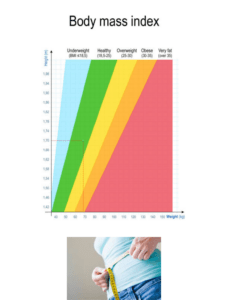Understanding Healthy Weight Management and Its Benefits
- Dr Owais Rafiq
- September 28, 2023
- 8:52 pm

Healthy Weight Management
Maintaining a healthy weight is important for your overall well-being. It means finding the right balance for your body by eating nutritious foods and staying active. By doing so, you can improve your heart health, reduce the risk of diseases, boost your energy levels, and feel great mentally. Let’s embark on this journey together and embrace the benefits of a healthy weight!

What is healthy weight?

Healthy weight for adults is determined by factors such as BMI and waist circumference. It involves maintaining a weight appropriate for height, age, and body composition. It is important for overall well-being and reducing chronic disease risk.
Healthy eating habits and regular physical activity are key. Finding balance and making sustainable lifestyle choices is crucial.
The Significance of Healthy Weight Management

Healthy weight management is important for overall health and well-being.
- It helps reduce the risk of chronic conditions like heart disease, diabetes, and certain cancers.
- Maintaining a healthy weight improves cardiovascular health and lowers blood pressure.
- It reduces the strain on joints and lowers the risk of musculoskeletal disorders.
- Better energy levels and overall vitality.
- Enhanced self-esteem and body confidence.
- Better sleep quality and improved restorative sleep.
- Enhanced mood and mental well-being.
Balanced nutrition and regular physical activity are key for successful weight management. Prioritizing healthy weight management leads to long-term health benefits and a higher quality of life.
Understanding Body Mass Index (BMI) and Waist Circumference
Body Mass Index (BMI) is a calculation based on weight and height that estimates body fat. BMI provides a general indication of whether a person is underweight, normal weight, overweight, or obese. The categories are typically defined as follows:
- Underweight: BMI less than 18.5
- Normal weight: BMI between 18.5 and 24.9
- Overweight: BMI between 25 and 29.9
- Obese: BMI of 30 or higher

Waist Circumference
It measures abdominal fat and is associated with health risks. High waist circumference increases the risk of heart disease, diabetes, and other metabolic conditions. Monitoring BMI and waist circumference can provide insights into weight status and health risks.
Healthy Eating Habits for Weight Management

- Consume a variety of fruits, vegetables, whole grains, lean proteins, and healthy fats.
- Avoid or reduce foods high in added sugars, saturated fats, and sodium.
- Be mindful of portion sizes to prevent overeating.
- Pay attention to hunger and fullness cues, eat slowly, and savor each bite.
- Drink plenty of water throughout the day to stay hydrated and support overall health.
Regular Physical Activity for Weight Management

Engage in 150 minutes of moderate or 75 minutes of vigorous exercise weekly, targeting major muscle groups on two or more days. Enjoy activities like walking, jogging, cycling, swimming, or dancing for long-term weight management
Behavior Modification and Lifestyle Changes

To support weight management, create a supportive environment promoting healthy eating and physical activity. Set realistic and sustainable goals while tracking progress for motivation and accountability. Prioritize sufficient sleep, effective stress management, healthy food choices, and self-care practices for overall success.

Conclusion
Achieving and maintaining a healthy weight through proper weight management is a significant aspect of overall health and well-being. By adopting healthy eating habits, engaging in regular physical activity, and making sustainable lifestyle changes, you can reap the benefits of improved physical health, reduced disease risk, and enhanced mental well-being.
Disclaimer:
This blog provides general information and encourages seeking medical care for specific conditions. It is important to note that this information is not a substitute for medical advice, and we cannot be held responsible for any consequence.
Dr Owais Rafiq
Subscribe to Dr Owais YouTube channel
For parenting advice, child health, symptoms, causes and treatment of illness in children.





